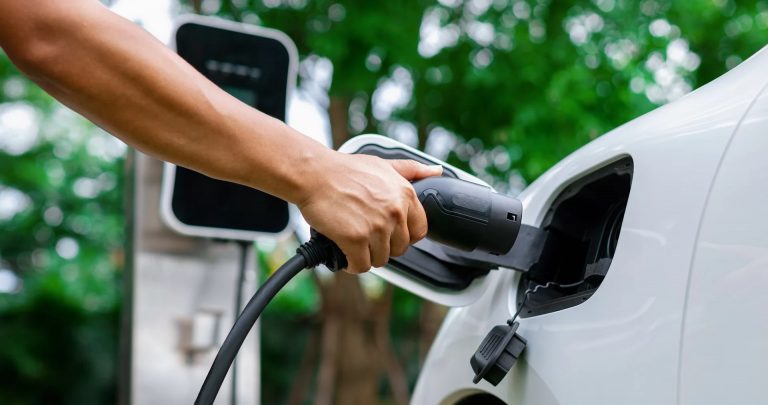
In a move that threatens to upend the U.S. electric vehicle (EV) industry, the Trump administration has ordered states to suspend spending under the $5 billion National Electric Vehicle Infrastructure (NEVI) program, one of the Biden administration’s key initiatives aimed at expanding the country’s EV charging network.
The Federal Highway Administration (FHWA) issued a memo on Thursday to state transportation directors, stating that all prior guidance on the NEVI program is rescinded, and no new spending can take place until a full review is completed.
This decision comes just weeks after President Donald Trump revoked a Biden-era executive order that aimed to ensure 50% of all new U.S. vehicles sold by 2030 were electric, signaling a full-scale rollback of EV-friendly policies.
Register for Tekedia Mini-MBA edition 19 (Feb 9 – May 2, 2026).
Register for Tekedia AI in Business Masterclass.
Join Tekedia Capital Syndicate and co-invest in great global startups.
Register for Tekedia AI Lab.
The memo, written by Emily Biondi, FHWA’s associate administrator for planning, environment, and realty, delivered the Trump administration’s directive in no uncertain terms.
“The new leadership of the Department of Transportation … has decided to review the policies underlying the implementation of the NEVI Formula Program,” she said.
As a result, she continued: “The current NEVI Formula Program Guidance dated June 11, 2024, and all prior versions of this guidance are rescinded.
“FHWA is also immediately suspending the approval of all State Electric Vehicle Infrastructure Deployment plans for all fiscal years. Therefore, effective immediately, no new obligations may occur under the NEVI Formula Program until the updated final NEVI Formula Program Guidance is issued and new State plans are submitted and approved.”
However, the administration will allow reimbursements for existing obligations, meaning some EV charging projects already underway will be completed, though future expansions are now in jeopardy.
Tesla Faces the Hardest Hit
Among the biggest casualties of Trump’s EV policy reversal is Tesla, the world’s leading electric vehicle manufacturer. While Tesla has enjoyed global dominance in the EV market, its largest and most important market remains the United States.
The company, led by CEO Elon Musk, has built its empire on the assumption that EV infrastructure in the U.S. would continue to expand. The NEVI program was a crucial component of this growth, ensuring that Tesla’s vehicles—and those of its competitors—would have an extensive nationwide charging network to support mass EV adoption.
By halting the program, the Trump administration, which is a pro fossil fuel, is effectively stalling Tesla’s domestic growth, making it more difficult for consumers to transition to electric cars.
Musk Seems Not To Care
Despite Tesla being the biggest loser in Trump’s war on EVs, Elon Musk remains an ardent supporter of the former president.
Musk has frequently defended Trump’s policies, aligning himself with the administration on deregulation, tax cuts, and corporate autonomy. Even as Trump aggressively moves to reverse the EV momentum built under Biden, Musk has shown little public concern.
However, industry analysts warn that Musk’s dismissive attitude toward the policy shift could prove costly.
While Tesla has maintained an overwhelming lead in the EV sector, the landscape is rapidly changing. Chinese automakers, particularly BYD, are gaining ground, offering cheaper EVs that are quickly eating into Tesla’s market share globally. European automakers, such as Volkswagen and Mercedes-Benz, have ramped up their own EV production, bolstered by more stable government policies in the EU.
In the United States, Ford and General Motors, while also impacted by Trump’s decision, could pivot more aggressively toward hybrid vehicles, an area where Tesla has no presence. If the U.S. EV infrastructure stagnates, Tesla may find itself losing its grip on the market, forcing it to spend billions more on private charging infrastructure—or risk slowing growth altogether.
Trump’s War on EVs: A Systematic Rollback
The NEVI freeze is just one part of Trump’s broader campaign against electric vehicles.
Throughout his 2024 presidential campaign, Trump made hostile remarks toward EVs, warning that Biden’s push for electric cars would destroy the U.S. auto industry. Among his most controversial statements was his claim that EV supporters should “rot in hell”, as well as his warning that Biden’s EV policies would cause a “bloodbath” in the auto industry.
Since returning to office, Trump has moved aggressively to dismantle EV incentives. He revoked Biden’s 2021 executive order that mandated 50% of all new cars sold by 2030 be electric and signaled plans to roll back EV tax credits, making electric cars less affordable for middle-class buyers. He has also weakened federal emissions standards, a move that benefits gas-powered vehicles over EVs.
Trump’s decision to freeze NEVI spending is already facing legal scrutiny.
Andrew Rogers, a former deputy FHWA administrator under President Biden, has warned that the memo “appears to ignore both the law and multiple restraining orders that have been issued by federal courts.” Furthermore, Rogers argues that the move violates the Impoundment Control Act of 1974, a law that prohibits presidents from withholding congressionally approved funds.
If challenged in court, Trump may be forced to release the NEVI funds, though legal battles could take months—or years—to resolve.
What’s Next for Tesla and the EV Industry?
For now, Tesla and the broader EV market face a critical inflection point. Without federal support for charging infrastructure, EV adoption in the U.S. could slow, making it harder for consumers to switch from gas-powered cars. Tesla may have to spend more on its own private Supercharger network, increasing costs and limiting expansion.
Analysts believe that Musk’s loyalty to Trump could eventually backfire, as the administration’s policies threaten to weaken Tesla’s U.S. market dominance.



